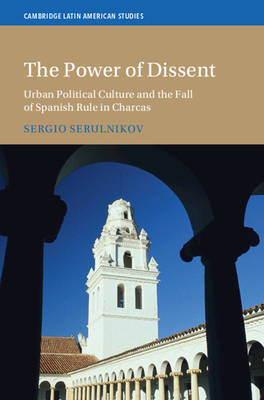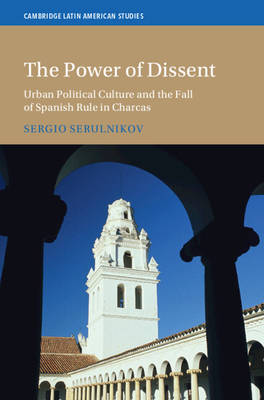
Bedankt voor het vertrouwen het afgelopen jaar! Om jou te bedanken bieden we GRATIS verzending (in België) aan op alles gedurende de hele maand januari.
- Afhalen na 1 uur in een winkel met voorraad
- In januari gratis thuislevering in België
- Ruim aanbod met 7 miljoen producten
Bedankt voor het vertrouwen het afgelopen jaar! Om jou te bedanken bieden we GRATIS verzending (in België) aan op alles gedurende de hele maand januari.
- Afhalen na 1 uur in een winkel met voorraad
- In januari gratis thuislevering in België
- Ruim aanbod met 7 miljoen producten
Zoeken
The Power of Dissent
Urban Political Culture and the Fall of Spanish Rule in Charcas
Sergio Serulnikov
€ 194,95
+ 389 punten
Omschrijving
The Power of Dissent examines the crisis of Spanish rule through the changing political culture of Chuquisaca (Bolivia), the most important city in the southern Andes. Sergio Serulnikov argues that in the four decades preceding the nineteenth-century wars of independence, a vibrant political public sphere emerged, both patrician and plebeian. It manifested itself in a variety of social domains: protracted legal battles, collective petitions, popular revolts, the culture of manly honor, disputes over the rights of city council members and university faculty to hold free annual elections to choose their authorities, clashes between urban militias and Spanish soldiers, and contested public ceremonies and rituals of state power. In the process, a discernible aspiration took shape: the full participation of the local population in public affairs. The culture of dissent undermined the very premises of Bourbon absolutism and, more broadly, imperial control.
Specificaties
Betrokkenen
- Auteur(s):
- Uitgeverij:
Inhoud
- Aantal bladzijden:
- 370
- Taal:
- Engels
- Reeks:
Eigenschappen
- Productcode (EAN):
- 9781009610070
- Verschijningsdatum:
- 7/08/2025
- Uitvoering:
- Hardcover
- Formaat:
- Genaaid
- Afmetingen:
- 152 mm x 229 mm
- Gewicht:
- 662 g

Alleen bij Standaard Boekhandel
+ 389 punten op je klantenkaart van Standaard Boekhandel
Beoordelingen
We publiceren alleen reviews die voldoen aan de voorwaarden voor reviews. Bekijk onze voorwaarden voor reviews.









